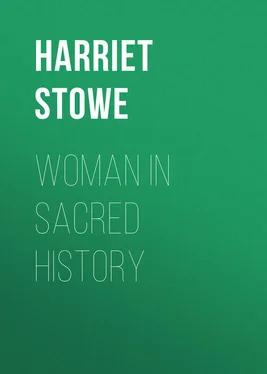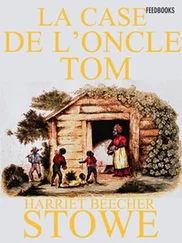Harriet Stowe - Woman in Sacred History
Здесь есть возможность читать онлайн «Harriet Stowe - Woman in Sacred History» — ознакомительный отрывок электронной книги совершенно бесплатно, а после прочтения отрывка купить полную версию. В некоторых случаях можно слушать аудио, скачать через торрент в формате fb2 и присутствует краткое содержание. Жанр: foreign_language, foreign_prose, на английском языке. Описание произведения, (предисловие) а так же отзывы посетителей доступны на портале библиотеки ЛибКат.
- Название:Woman in Sacred History
- Автор:
- Жанр:
- Год:неизвестен
- ISBN:нет данных
- Рейтинг книги:5 / 5. Голосов: 1
-
Избранное:Добавить в избранное
- Отзывы:
-
Ваша оценка:
- 100
- 1
- 2
- 3
- 4
- 5
Woman in Sacred History: краткое содержание, описание и аннотация
Предлагаем к чтению аннотацию, описание, краткое содержание или предисловие (зависит от того, что написал сам автор книги «Woman in Sacred History»). Если вы не нашли необходимую информацию о книге — напишите в комментариях, мы постараемся отыскать её.
Woman in Sacred History — читать онлайн ознакомительный отрывок
Ниже представлен текст книги, разбитый по страницам. Система сохранения места последней прочитанной страницы, позволяет с удобством читать онлайн бесплатно книгу «Woman in Sacred History», без необходимости каждый раз заново искать на чём Вы остановились. Поставьте закладку, и сможете в любой момент перейти на страницу, на которой закончили чтение.
Интервал:
Закладка:
The marriage of Isaac and Rebekah was more like the type of a Christian marriage than any other on record. No other wife shared a place in his heart and home; and, even to old age, Isaac knew no other than the bride of his youth. From this union sprang twin boys; between whom, as is often the case, there was a remarkable difference. The physical energy and fire all seemed to go to one, the gentler and more quiet traits to the other. Esau was the wild huntsman, the ranger of the mountains, delighting in force, – precisely adapted to become the chief of a predatory tribe. Jacob, the patient, the prudent, the submissive, was the home child, the darling of his mother. Now, with every constitutional excellency and virtue is inevitably connected, in our imperfect humanity, the liability to a fault. The peace-loving and prudent, averse to strife, are liable to sins of artifice and deception, as stronger natures are to those of force and violence. Probably, in the calm eye of Him who sees things just as they are, the one kind of fault is no worse than the other. At all events, the sacred narrative is a daguerreotype of character; it reflects every trait and every imperfection without comment. The mild and dreamy Isaac, to save his wife from a rapacious king, undertakes to practice the same artifice that his father used before him, saying, "She is my sister"; and the same evil consequence ensues. The lesson of artifice once taught in the family, the evil spreads. Rebekah, when Isaac is old and doting, commands Jacob to personate his older brother, and thus gain the patriarchal blessing, which in those days had the force of a last will and testament in our times. Yet, through all the faults and errors of the mere human actors runs the thread of a Divine guidance. Before the birth of Jacob it was predicted that he should be the chosen head of the forming nation; and by his mother's artifice, and his own participation in it, that prediction is fulfilled. Yet the natural punishment of the action follows. Esau is alienated, and meditates murder in his heart; and Jacob, though the mother's darling, is driven out from his home a hunted fugitive, parted from her for life. He starts on foot to find his way to Padan-Aram, to his father's kindred, there to seek and meet and woo the wife appointed for him.
It is here that the history of the patriarch Jacob becomes immediately helpful to all men in all ages. And its usefulness consists in just this, – that Jacob, at this time in his life, was no saint or hero. He was not a person distinguished either by intellect or by high moral attainment, but simply such a raw, unformed lad as life is constantly casting adrift from the shelter of homes. He is no better and no worse than the multitude of boys, partly good and partly bad, who, for one reason or another, are forced to leave their mothers and their fathers; to take staff in hand and start out on the great life-journey alone. He had been religiously brought up; he knew that his father and his mother had a God, – the Invisible God of Abraham and Isaac; but then, other gods and lords many were worshiped in the tribes around him, and how did he know, after all, which was the right one? He wanders on over the wide, lonesome Syrian plains, till dark night comes on, and he finds himself all alone, an atom in the great silent creation, – alone, as many a sailor-boy has found himself on the deck of his ship, or hunter, in the deep recesses of the forest. The desolate lad gathers a heap of stones for a pillow and lies down to sleep. Nothing could be more sorrowfully helpless than this picture; the representative portrait of many a mother's boy to-day, and in all days. We cannot suppose that he prayed or commended his soul to God. We are told distinctly that he did not even remember that God was in that place. He lies down, helpless and forlorn, on his cold stone pillow, and sinks, overcome with fatigue, to prayerless slumber. And now, in his dreams, a glorious light appears; a luminous path opens upward to the skies, – angels are passing to and fro upon it, and above, in bright benignity, stands a visible form, and says: "I am the Lord God of Abraham thy father, and the God of Isaac: the land whereon thou liest, to thee will I give it, and to thy seed; and thy seed shall be as the dust of the earth; and thou shalt spread abroad to the west, and to the east, and to the north, and to the south; and in thee and in thy seed shall all the families of the earth be blessed. And, behold, I am with thee, and will keep thee in all places whither thou goest, and will bring thee again unto this land; for I will not leave thee, until I have done that which I have spoken to thee of. And Jacob awaked out of his sleep, and he said, Surely the Lord is in this place; and I knew it not. And he was afraid, and said, How dreadful is this place! This is none other but the house of God, and this is the gate of heaven. And Jacob arose up early in the morning, and took the stone that he had put for his pillow, and set it up for a pillar, and poured oil upon the top of it. And Jacob vowed a vow, saying, If God will be with me, and will keep me in this way that I go, and will give me bread to eat, and raiment to put on, so that I come again to my father's house in peace, then shall the Lord be my God: and this stone, which I have set for a pillar, shall be God's house: and of all that Thou shalt give me I will surely give the tenth unto thee."
In one night how much is born in that soul! The sentiment of reverence, awe of the Divine, – a conviction of the reality of God and an invisible world, – and the beginning of that great experiment by which man learns practically that God is his father. For, in the outset, every human being's consciousness of God must be just of this sort. Have I a Father in heaven? Does he care for me? Will he help me? Questions that each man can only answer as Jacob did, by casting himself upon God in a matter-of-fact, practical way in the exigencies of this present life. And this history is the more valuable because it takes man in his earlier stages of imperfection. We are apt to feel that it might be safe for Paul, or Isaiah, or other great saints, to expect God to befriend them; but here a poor, untaught shepherd boy, who is not religious, avows that, up to this time, he has had no sense of God; and yet between him and heaven there is a pathway, and about him in his loneliness are ministering spirits; and the God of Abraham and of Isaac is ready to become his friend. In an important sense, this night dream, this gracious promise of God to Jacob, are not merely for him, but for all erring, helpless, suffering sons of men. In the fatherly God thus revealed to the patriarch, we see the first fruits of the promise that through him all nations should be blessed.
The next step of the drama shows us a scene of sylvan simplicity. About the old well in Haran, shepherds are waiting with their flocks, when the stripling approaches: "And Jacob said unto them, My brethren, whence be ye? And they said, Of Haran are we. And he said unto them, Know ye Laban the son of Nahor? And they said, We know him. And he said unto them, Is he well? And they said, He is well: and, behold, Rachel his daughter cometh with the sheep. And he said, Lo, it is yet high day, neither is it time that the cattle should be gathered together. Water ye the sheep, and go and feed them. And they said, We cannot, until all the flocks be gathered together, and till they roll the stone from the well's mouth; then we water the sheep. And while he yet spake with them Rachel came with her father's sheep; for she kept them. And it came to pass, when Jacob saw Rachel, the daughter of Laban, his mother's brother, and the sheep of Laban, his mother's brother, that Jacob went near, and rolled the stone from the well's mouth, and watered the flock of Laban, his mother's brother. And Jacob kissed Rachel, and lifted up his voice, and wept; and Jacob told Rachel that he was her father's brother, and that he was Rebekah's son: and she ran and told her father. And it came to pass, when Laban heard the tidings of Jacob, his sister's son, that he ran to meet him, and embraced him, and kissed him, and brought him to his house."
Читать дальшеИнтервал:
Закладка:
Похожие книги на «Woman in Sacred History»
Представляем Вашему вниманию похожие книги на «Woman in Sacred History» списком для выбора. Мы отобрали схожую по названию и смыслу литературу в надежде предоставить читателям больше вариантов отыскать новые, интересные, ещё непрочитанные произведения.
Обсуждение, отзывы о книге «Woman in Sacred History» и просто собственные мнения читателей. Оставьте ваши комментарии, напишите, что Вы думаете о произведении, его смысле или главных героях. Укажите что конкретно понравилось, а что нет, и почему Вы так считаете.












